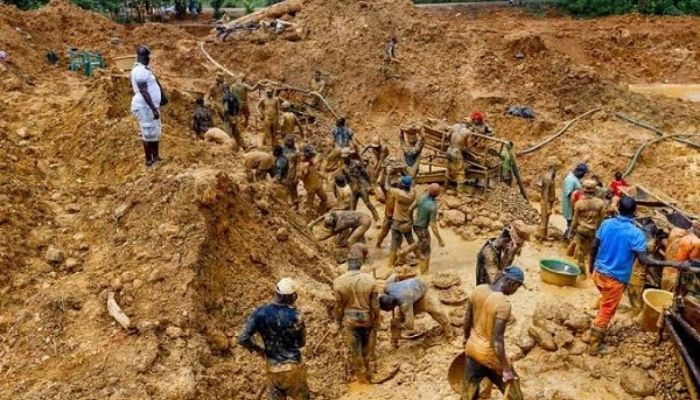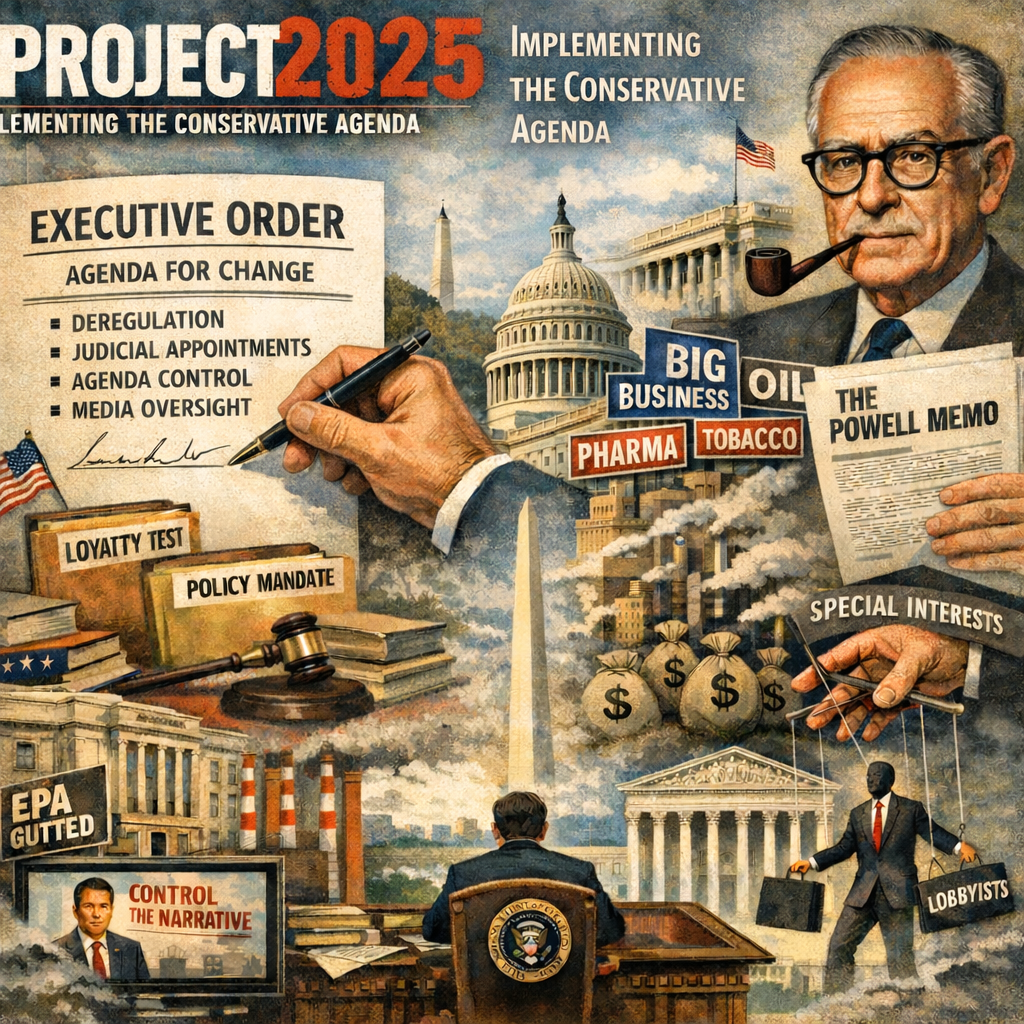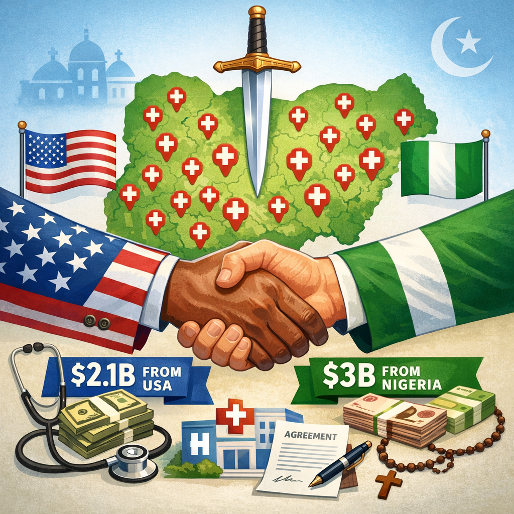
Sustainable Development and Mining Host communities
By
Otive Igbuzor, PhD, FPSN, FSM, MIoL, UK
African Centre for Leadership, Strategy & Development
(Centre LSD),
3B Niger Avenue, Villa Nova Estate, Apo, Abuja, Nigeria.
E-mail: Otive.Igbuzor@centrelsd.org
KEYNOTE ADDRESS PRESENTED AT THE LAUNCH OF RESEARCH REPORT, DOCUMENTARY, AND MOBILE APP ON MINING HOST COMMUNITIES ON 31ST JANUARY 2024 IN ABUJA, NIGERIA.
1. INTRODUCTION
Mining can play a crucial role in Nigeria’s economic development and has the potential to contribute significantly to revenue generation and job creation. However, the impact of mining on host communities has largely been negative leading to environmental degradation, social disruption, and economic inequalities.
In this keynote address, we argue that it is important to #DoMiningRight in a sustainable manner so that government, mining companies, citizens, and host communities will benefit from the gains of decent and responsible mining practices. But first, we clarify the concepts of sustainable development and mining host communities and describe mining in Nigeria and its impact on host communities.
2. CONCEPTUAL CLARIFICATIONS
a. SUSTAINABLE DEVELOPMENT
Human beings have always been concerned about how to improve their condition of living and better confront the forces of nature and the environment. Over the years, a lot of progress has been made on how to deal with the challenges of development and improve the standard and condition of living of human beings. It has been well established that every society has the capacity to develop and all societies strive for development. But the concept of development is a very controversial one. We have argued elsewhere that the definitions and interpretations of development are influenced by history, discipline, ideological orientation and training.[1] Chambers defines development as “good change”.[2] This definition envisages that development is synonymous with progress. This progress should entail an all-encompassing improvement, a process that builds on itself and involves both individual and social change.[3] Kamghampati argues that development requires growth and structural change, some measure of distributive equity, modernization in social and cultural attitudes, a degree of political transformation and stability, an improvement in health and education so that population growth stabilizes, and an increase in urban living and employment.[4] In our view, development always involves change that affects various facets of life including economic, social, and political spheres. Sustainable development means that development is achieved without excess environmental degradation, in a way that both protects the rights and opportunities of coming generations and contributes to compatible approaches.[5] .
b. HOST COMMUNITY
The term host community has been very controversial in Nigeria, especially in relation to host communities in the oil and gas sector. In relation to the oil and gas sector, host communities have been defined in three ways.[6] Firstly, a host community has been defined as a community where oil is extracted from and houses facilities for the exploration and extraction of oil. Secondly, a host community has been defined as a community that is impoverished as a result of the exploration and extraction of petroleum products. This definition includes communities without oil but has oil pipelines passing through them. Thirdly, a host community has been defined as a community and a contingent community where the extraction of hydrocarbon takes place. These three definitions can be applied to the mining sector in the definition of a host community as a community where mineral extraction takes place or a community impoverished by exploration and extraction of minerals or communities and contingent communities where extraction takes place. But according to the Mining Act, the host community is the community where the mineral title area is located or the community closest to it. We have adopted the definition of the Act as our working definition.
3. MINING IN NIGERIA
Nigeria is endowed with abundant natural mineral resources such as Iron, lead-zinc, tin, tungsten, gold, manganese, nickel, barite, halite, talc, kaolin, gemstones, limestone, marble, and granite.[7] The mining sector once made a substantial contribution of about 4-5 percent of the Gross Domestic Product (GDP) in the 1960s and 1970s. But with the discovery of oil, the sector suffered neglect with the sector contributing only 0.17 percent to GDP in recent years (2018-2022).[8] The mining roadmap sets the target of 3 percent by 2025.[9] The mining roadmap was developed in 2016 to drive the growth and development of the mining sector. The roadmap identified strategic minerals to include gold, lead-zinc, coal, bitumen, Iron ore, limestone, and barite. But the sector is challenged by many factors including insecurity, smuggling, State and Federal Government tax alignment, illegal mining, weak value addition, low level of mining mechanisation, and inadequate funding.
In Nigeria, there are a number of laws applicable to the mining sector such as the Constitution of the Federal Republic of Nigeria 1999 (as amended), the Land Use Act, Nigerian Minerals and Mining Act, 2007, Nigerian Minerals and Mining Regulations 2011 and the Guidelines on Mineral Titles Application (January 2014). There are also secondary legislations regulating the mining industry such as the Environmental Impact Assessment Act, Foreign Exchange (Monitoring and Miscellaneous Provisions) Act, Nigerian Investment Promotion Act, and the Nigerian (Export Incentives and Miscellaneous Provisions) Act.[10] The Constitution is the supreme law of any country and it contains the rules and regulations both legal and non-legal which ordain, order, regulate, and sustain the governance of a given country.[11] The Constitution vests the entire property in and control of all minerals, mineral oils, and natural resources under or upon any land in Nigeria in the Government of the Federation.[12] The Mining Act is the major legislation governing the mining sector in Nigeria. It regulates all aspects of the exploration and exploitation of solid minerals in Nigeria. The Mining regulations contain detailed provisions for the administration of mineral titles by the Mining Cadastre Office including the procedure, duration and documentation required for the application of a small-scale mining lease and for the application of a permit to export minerals for commercial purposes. The Land Use Act governs land acquisition and ownership in Nigeria. The use of land for mining purposes is considered as constituting an overriding public interest and the Governor of a State is empowered to revoke an existing statutory right of occupancy for mining purposes. Under the Mining Act, different permits can be obtained including Reconnaissance Permit, Exploration licence, Small Scale Mining lease, Mining lease, Quarry lease, and Water use permit. A Reconnaissance Permit is granted for the purpose of carrying out preliminary prospecting of a mineral through aerial, geophysical or geo-chemical surveys and geological mapping. Exploration licence gives its holder the exclusive right to conduct exploration activities within the area permitted. Small- Scale Mining is defined under the Mining Act as “artisanal, alluvial and other forms of mining operations involving the use of low-level technology or application of methods not requiring substantial expenditure for the conduct of mining operations within a small scale.” A mining lease grants the holder of the mineral title the right to obtain access and enter the mining lease area to carry out exclusive exploration and exploitation of mineral resources activities. Quarry leases in Nigeria are granted in respect of all naturally quarriable minerals such as asbestos, China clay, fuller’s earth, gypsum, marble, limestone, mica, pipe clay, slate, sand, stone, laterite and gravel. A Water Use Permit can be granted only to holders of exploration licence, small-scale mining licence, mining leases or quarry leases.
In order to implement these laws and regulations, the government created offices such as the Ministry of Mines and Steel Development vested with the responsibility of overall administration of the mining sector.[13] The Mining Cadastre Office (MCO) was established with the objective of administering mineral titles and maintaining cadastral registers including consideration of application for mineral titles and permits. The Mines Inspectorate department has the duty of supervising all reconnaissance, exploration and mining operations for the purposes of ensuring that they comply with the provisions of the law. The Mines Environmental Compliance department is responsible for monitoring and enforcing compliance with all the environmental requirements according to the law. The artisanal and small-scale mining department is responsible for assisting and supporting small-scale and artisanal mining operations in the country.
It is important to note that despite the existence of comprehensive laws, regulatory framework, and regulations in the mining sector, enforcement remains a challenge due to limited resources, corruption, and institutional weakness within the regulatory bodies.
4. IMPACT OF MINING ON HOST COMMUNITIES
The mining sector has made contributions to the GDP, employment, and profit for many companies in Nigeria but the benefits have not always translated to the well-being of the host communities. Unsustainable, indecent, and irresponsible mining practices have resulted in environmental degradation, loss of biodiversity, and social challenges. The impact can be divided into three categories:
a. Environmental degradation: Mining activities have led to deforestation, soil erosion, and water pollution. It destroys the ecosystem, agriculture, and livelihoods in host communities.
b. Social disruption: Mining activities not only destroy the livelihood of host communities but bring about an influx of transient workers with higher economic powers bringing disruption to the community.
c. Economic inequalities: Mining communities experience the invasion of foreigners and workers of mining companies whose social class and economic power are different from the host communities.
5. THE NEED FOR SUSTAINABLE DEVELOPMENT
There is a need for decent and responsible mining practices that will ensure sustainable development and prevent environmental degradation, social disruption, and economic inequality. In other words, it is important to #DoMiningRight in line with the Africa Mining Vision. The Africa Mining Vision was adopted by Heads of State in 2009 in response to the paradox of great mineral wealth existing side by side with pervasive poverty. It is aimed at ensuring that mining is integrated into development at local, national, and regional levels in such a way that mining is beneficial to government, workers, and host communities. In line with the Africa Mining Vision, the African Centre for Leadership, Strategy & Development (Centre LSD) developed the twenty principles of #DoMiningRight.
Government
1. The government should ensure decent mining that will be beneficial to citizens (including future generations) and not destroy the environment.
2. The mining process should ensure local processing and value addition.
3. The resources from mining should be used for social and economic development.
4. The government should support and harness the potential of small-scale miners and improve the livelihood of mining communities.
5. The government should build the capacity of Nigerians to engage in innovation, research and development of the mining sector.
6. The government should build the capacity of institutions responsible for mining activities to perform optimally from exploration to fabrication, marketing, and mine closure.
7. The government should ensure transparent and accountable governance of the sector with principles of open government.
8. The government should ensure that the mining companies operate in accordance with international standards and best practices with the protection of the environment, community participation, and corporate social responsibility.
9. The government should ensure that communities participate in decision-making with respect to the mineral sector and that there is equity in the distribution of benefits.
10. The government should ensure the enforcement of health, safety, and environmental standards.
11. The government should ensure that the mining policies have a focus on development and discourage transfer pricing.
12. The government should ensure proper geological and mining information systems with a focus on using the information for development.
Mining Companies
13. The mining companies should practice decent mining and ensure adherence to international standards, protection of the environment, and Corporate Social Responsibility (CSR).
14. The mining companies should ensure citizen participation and abide by the local content law.
15. The mining companies should enter into a Memorandum of Understanding (MoU) with mining communities and respect the spirit and letter of the MoUs.
16. The mining companies should ensure that policies and conditions are created for the health, safety, compensation, and good working conditions for mining workers.
Civil Society Organisations
17. Civil Society Organisations (CSOs) should support mining communities to improve their capacity to organize and negotiate with government and mining companies.
18. Civil Society Organisations should advocate and campaign for #Do Mining Right.
Mining Communities
19. The Mining Communities should organize themselves and participate in decision-making concerning the mining sector including participation in ownership of assets.
20. The mining communities should build their capacity to engage government and mining companies and advocate and campaign for decent mining (#DoMiningRight).
#DoMiningRight will at least produce three outcomes:
a. Environmental stewardship: #DoMiningRight will ensure that mining will be done in accordance with international standards and best practices for the protection of the environment. In addition, good Corporate Social Responsibility (CSR) will ensure that there is reforestation, proper waste management, and the use of environmentally friendly technologies that can mitigate environmental impact.
b. Social Inclusivity: #DoMiningRight will ensure that mining host communities will organise themselves and participate in decision making including participation in ownership of assets. This will involve Community Development Agreements (CDAs). All of these will ensure that there is a transparent decision-making process and the benefit of mining will go to host communities in such a way that it will address social disruptions.
c. Economic Diversification: #DoMiningRight will lead to more revenue to the government because there will be local processing, value addition, and improved capacity to engage in innovation, research and development of the mining sector. The end result will be diversification of the Nigerian economy which several political leaders have talked about in the past but happening very slowly.
6. SUCCESSFUL MODELS OF SUSTAINABLE MINING
There are successful models of sustainable mining practices that Nigeria can learn from in Canada, Australia, and Norway. These countries recognise the need for commitment to environmental and social responsibility in the mining sector. They have therefore put in place regulatory frameworks, industry initiatives, and corporate practices that will contribute to sustainable mining.
In Canada, there is a robust regulatory framework that puts a lot of emphasis on environmental protection, community engagement, and indigenous rights. There are legislations such as the Impact Assessment Act and the Metal Effluent Regulation that set strict standards for mining operations. In addition, Canadian mining companies are well known for their CSR initiatives. They support local communities with education, health care, and infrastructure. Examples include Teck Resources and Barrick Gold who are well known for their CSR initiatives. In Australia, there is a lot of focus on environmental rehabilitation and biodiversity conservation. For instance, the Environmental Protection and Biodiversity Conservation Act (EPBC Act) of Australia ensures that mining projects undergo rigorous environmental assessments. In addition, Australia prioritises the rights and interests of indigenous (host) communities in mining areas. The Native Title Act ensures proper consultation and negotiation between mining companies and host communities. In Norway, there are strict regulations governing mining activities addressing issues of environmental sustainability and responsible resource management. Examples of such legislation include the Water Resources Management and Planning and Building Act. In addition, Norwegian mining companies leverage innovative technologies to reduce environmental impact including the use of autonomous vehicles, renewable energy sources, and efficient water management.
In Africa, there are examples of sustainable mining practices. In Ghana, the Ashanti Goldfields Obuasi mine implemented sustainable mining practices including reforestation projects and community development initiatives. In South Africa, the Finsch Diamond Mine focuses on water conservation, energy efficiency, and community development to promote sustainable mining. In Zambia, the Kansanshi mine implemented a comprehensive social responsibility programme addressing education, health care, and infrastructure in local communities.
In Nigeria, there are emerging examples of sustainable mining initiatives. For instance, Dangote Mining Company has implemented community development projects including the construction of schools and health care facilities. Moreover, BAU Group and Global Rights are partnering to address environmental and social concerns through sustainable practices.
The lessons from all of these are that for sustainable mining, there is a need for countries to focus on the following four issues:
a. Mitigate environmental impact.
b. Promote CSR and implementation of CDA.
c. Strengthen regulatory framework and implement them.
d. Ensure mining companies embrace CSR and implement CDA.
7. CONCLUSION AND THE WAY FORWARD
There is no doubt that mining can play a crucial role in Nigeria’s economic development. Mining has the potential to make significant contributions to revenue generation and job creation in Nigeria. But at the moment, mining in Nigeria has a negative impact on host communities causing a lot of environmental degradation, social disruption, and economic inequalities. But there is a great need for decent and responsible mining practices that will ensure sustainable development. Drawing from the Africa Mining Vision, this can be done through #DoMiningRight which will assure environmental stewardship, social inclusivity, and economic diversification.
Nigeria can learn from successful models of sustainable mining in other countries and focus on mitigation of environmental impact, promotion of CSR and implementation of CDAs, strengthening of regulatory frameworks with emphasis on implementation, and ensuring that mining companies embrace CSR and full implementation of CDAs.
ENDNOTES
[1] Igbuzor, O (2005), Perspectives on Democracy and Development. Lagos, Joe-Tolalu & Associates.
[2] Chambers, R. (1997), Whose Reality Counts? Putting the First Last. London, Intermediate Technology Publication.
[3] Thomas, A (2000), “Meanings and Views of Development” in Allen T and Thomas A (Eds), Poverty and Development in the 21st Century. UK, Oxford University Press.
[4] Kambhampati, U. S. (2004), Development and the Developing World. UK, Polity Press.
[5] Dalal-Clayton, B and Bass, S (Ed)(2002), Sustainable Development Strategies: A Resource Book. London, OECD, and UNDP
[6] Spaces for Change (2013), What is a host community. https://spacesforchange.org/what-is-a-host-community/.
[7] Adetuyi, Adetayo and Williams, Nnanke, Understanding the Legal and Regulatory Considerations for Mining Solid Minerals in Nigeria. Brooks and Knights.
[8] Nigerian Mining-Progress, But still a long way to go. July, 2023. Price Waterhouse Coopers (PWC)
[9] Nigeria Mining Growth Roadmap 2016-2025.
[10] Adetuyi, Op Cit
[11] Igbuzor, O (2005), Perspectives on Democracy and Development. Lagos, Joe-Tolalu & Associates.
[12] The Constitution of the Federal Republic of Nigeria 1999 (as amended). Section 44(3).
[13] Advocaat Law Practice (2015), The Legal and Regulatory Framework for Mining in Nigeria: A Catalyst for Investment.
RETURN

From the Powell Memo to Project 2025: How a 1971 Corporate Strategy Became a Global Template for Power In August 1971, a corporate lawyer named L...
The Market’s Mood Ring: How Volatility Across Assets Traces a Hidden Geometry of SentimentIf you want a fast, honest way to describe modern markets,...
Nigeria’s grid collapses are not ‘bad luck’ – They are a design failure, and we know how to fix themFirst published in VANGUARD on February 3,...

Islands of Credibility: Nigeria’s Best Reform Strategy Starts in the StatesFirst published in VANGUARD on January 31, 2026 https://www.vanguard...

Project 2025 Agenda and Healthcare in NigeriaThe US and Nigeria signed a five-year $5.1B Memorandum of Understanding (MoU) on December 19, 2025, to bo...